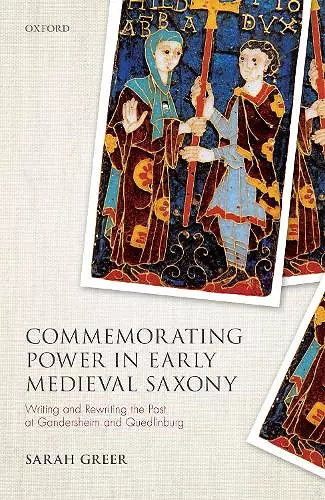Commemorating Power in Early Medieval Saxony
Writing and Rewriting the Past at Gandersheim and Quedlinburg
Format:Hardback
Publisher:Oxford University Press
Published:26th Oct '21
Currently unavailable, and unfortunately no date known when it will be back

In the early medieval world, the way people remembered the past changed how they saw the present. New accounts of former leaders and their deeds could strengthen their successors, establish novel claims to power, or criticize the current ruler. After 888, when the Carolingian Empire fractured into the smaller kingdoms of medieval western Europe, memory became a vital tool for those seeking to claim royal power for themselves. Commemorating Power in Early Medieval Saxony looks at how the past was evoked for political purposes under a new Saxon dynasty, the Ottonians, who came to dominate post-Carolingian Europe as the rulers of a new empire in Germany and Italy. With the accession of the first Ottonian king, Henry I, in 919, sites commemorating the king's family came to the foreground of the medieval German kingdom. The most remarkable of these were two convents of monastic women, Gandersheim and Quedlinburg, whose prominence and prestige in Ottonian politics have been seen as exceptional in the history of early medieval western Europe. In this volume, Sarah Greer offers a fresh interpretation of how these convents became central sites in the new Ottonian empire by revealing how the women in these communities themselves were skilful political actors who were more than capable of manipulating memory for their own benefit. In this first major study in English of how these Saxon convents functioned as memorial centres, Greer presents a new vision of the first German dynasty, one characterized by contingency, versatility, and the power of the past.
Greer has produced a detailed and insightful study on the reshaping of dynasty memory with relevance to historians of early medieval monasticisms, dynasties, and the Ottonian world writ large. * Ingrid Rembold, Early Medieval Europe *
Sarah Greer's new book makes transformative interventions in decades of scholarship on Ottonian Saxony. * Felice Lifshitz, Speculum 99/1 *
The book has well-constructed arguments and is a pleasure to read. Dr Greer includes a welcome variety of manuscripts, primary sources, and mostly English and German secondary sources. The book will be of most use to professionals and eager students of the 'face' of power, the Ottonian dynasty and the workings of early medieval monasteries. It will be a reference book for courses in early medieval studies of Europe, especially of early Germany, and for courses about memory and general historiography. * Penelope Nash, Journal of the Australian Early Medieval Association *
ISBN: 9780198850137
Dimensions: 240mm x 265mm x 12mm
Weight: 528g
222 pages